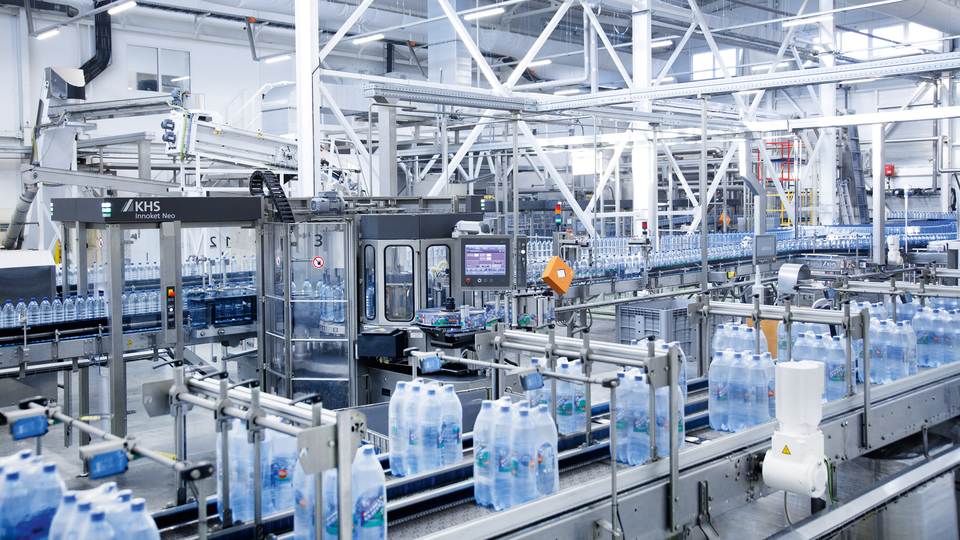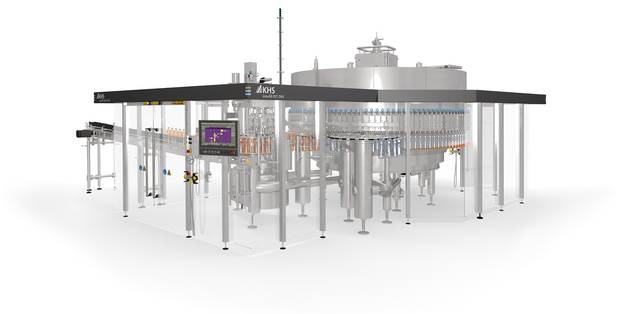For many hundreds of years people have trusted in the healing powers of mineral water from Transcarpathia, a mountainous region in the far west of Ukraine. No fewer than four countries – Poland, Slovakia, Hungary and Romania – are a mere stone’s throw from the Polyana Kvasova mineral water bottling plant, making for an extremely diverse populace in this part of the country. The mineral springs were first mentioned in a document in 1463; a letter to King of Hungary Matthias Corvinus describes the curative properties of the water that’s now sold under the brand name Svalyava in the whole of Ukraine and beyond.
The quality and effects of the medicinal water only became more widely appreciated much later: in 1842 Svalyava was voted one of the best-tasting waters at an exposition in Budapest and in 1855 it even won a gold medal in Paris. Together with the Polyana Kvasova and Luzhanskaya brands bottled from neighboring springs, in the decades that followed it went on to collect further prizes at various international exhibitions. Finally, in the 20th century the products were extremely popular throughout the entire Soviet Union. And even now, exiled Ukrainians and former Soviet citizens living in the USA and Canada don’t want to do without the trusted thirst-quencher from their former homeland.
“The particular virtues of our curative waters are inextricably linked to their natural origin,” explains Ganna Kotlyarevska, president of company Ukrainian Mineral Waters (UMW) that took over the springs as bottler in 1995. “The water’s stored deep in the rock in underground lakes where it's enriched with minerals.” So that concentrations stay at a constant high and there’s no loss of quality, the daily bottling quantity is strictly limited.
»We profit from the great local expertise of KHS’ experienced specialists.«
Minimizes product loss
“With the amount we can process restricted, our only chance for growth is to constantly reduce product loss during the filling process,” Kotlyarevska emphasizes. “In order to do so, we need a modern, high quality technical solution.” UMW ultimately found what it was looking for with German machine and systems manufacturer KHS, subsequently investing in a new non-returnable PET line. This comprises a stretch blow molder/filler block, a roll-fed labeler and a packaging and palletizing section featuring a shrink packer and robot-controlled palletizer. The line was commissioned in the spring of 2020 with a capacity of up to 22,000 1.5-liter bottles an hour. Kotlyarevska is extremely satisfied with the result. “Whereas our previous system could only fill about 85% of the spring’s output into our bottles, with our KHS line we now have a rate of about 98%,” she smiles. “We’ve thus come a lot closer to achieving our goal of bringing our full water contingent to market.”
The higher efficiency of the new line doesn’t end with the much improved utilization of the company’s water resources, however. KHS’ high-tech equipment also scores points with its considerable material savings, starting by halving the former preform loss to 0.6% and going on to also reduce key components such as caps and shrink film. One particularly large saving is made by the lighter bottles that can be manufactured on the machines. “If you need less plastic, you cut your production costs and at the same time bring less plastic into circulation – which is good for both the climate and the environment,” stresses Alexander Pismenny, managing director of KHS Ukraine, Belarus and Moldova. “The experts from our holistic Bottles & Shapes service program were able to make major improvements by changing the bottle geometry. UMW wants to continue on this course in the future, too. In doing so, it won’t have to compromise on the visual highlights by any means: thanks to the expertise of my KHS colleagues at the PET Competence Center in Hamburg, we were able to transfer the high-quality, characteristic embossing to the customer’s new containers, for example.”
Besides the actual PET bottle itself, it’s the dressing that creates the right visual impression: the no-label look makes it seem as if the text and image elements have been printed directly onto the bottle’s surface. The film is applied by a KHS Innoket Neo roll-fed labeler. On it, the material automatically runs off the reel into the machine where it’s cut to exactly the right length. In order to avoid production stops while the reel is being changed, UMW had the labeler equipped with a double station complete with an automatic changeover function.
High demand for quality
The premium product design advertises the quality of UMW’s products from the supermarket shelf. Ganna Kotlyarevska attributes this to the combination of her high-quality water with the outstanding technical standards of the KHS plant engineering. “For us, it’s of prime importance that the consumer purchases our mineral water in exactly the same state as it’s drawn from the well. We do our utmost to ensure that its natural properties are fully retained. We apply the same standard to the packaging.” A country as huge as Ukraine makes great demands of a product’s transportability. Owing to the vast distances and often less-than-perfect road conditions, UMW has found that the railroad especially provides a safe and efficient form of transport for its dispatch logistics. “Here, too, KHS’ new technology has proved beneficial to us,” the president claims. “On our old palletizer we couldn’t achieve the necessary packing density. This meant that the packaging often suffered considerable damage during transport by rail. As we can now palletize our products much more densely and robustly, our water reaches its destination in the same quality we dispatched it in.”
Water from the pharmacy
In order to understand why UMW makes such high demands of processing and packaging, we should mention that the Ukrainian market and quality leader in the medicinal waters segment also distributes its products through pharmacies. “The minerals contained in our products have a positive effect on the gastrointestinal and upper respiratory tracts,” explains Ganna Kotlyarevska. “Svalyava, for instance, is a hydrocarbonate sodium boric mineral water that helps to combat hyperacidity in the stomach. Its minerals neutralize the acid and relieve heartburn and heaviness in the stomach. It also stimulates the function of the gallbladder and pancreas. This in turn increases the activity of digestive enzymes.”
The other two water brands Polyana Kvasova and Luzhanskaya belong to the same group and maintain the body’s acid-base balance, Kotlyarevska tells us. While the one helps with obesity, chronic pancreatitis and hepatitis the other positively affects the metabolism with its high calcium, silicic acid and fluorine content. It’s thus recommended for diabetes mellitus, for example.

All of the aforementioned medicinal waters also have another very positive side effect, the UMW proprietor adds with a grin; they provide fast and effective relief from the symptoms of a hangover!
Kotlyarevska herself definitely holds no regrets regarding her decision to invest: although the new, large, highly automated line at first seemed a rather daring venture, she’s long ceased to harbor any doubts. Her new KHS technology is running perfectly smoothly and has an efficiency of well over 90%. The line is managed by just three operators. “This is half of the people we needed on the old setup. The simple handling is an undeniable advantage in our region,” she ascertains. “Most qualified expert personnel look for work in the neighboring EU countries and replacements can only be found in return for high wages – or not at all. With the help of KHS we’ve trained our employees to work on all modules. This means that they can substitute for one another at any point on the line if necessary.”
Local expertise
One main reason for her satisfaction is the local presence of the KHS team in Ukraine, Kotlyarevska says. “We profit from great local expertise. KHS’ experienced specialists answer all of our questions regarding operation of the system within a very short space of time indeed.” KHS managing director Pismenny agrees. “Our local team was all the more helpful to UMW because installation and commissioning coincided with the peak of the corona pandemic, when German specialists could only enter the country under extremely difficult conditions.”
The new PET line also makes production control and monitoring much more state of the art at UMW. “Although there’s a distance of several hundred kilometers between our headquarters in Kiev and our bottling plants, we now have all of our processes in view,” Ganna Kotlyarevska says happily. “We’ll continue to tread this path. Based on the positive experience we’ve had with KHS, we’re planning further modernizations in the future. But that’s another story ...”
Any further questions?
Alexander Pismenny
KHS Ukraine GmbH, Kiev
Phone: +380 44 593 8616
Email: alexander.pismenny@khs.com

























